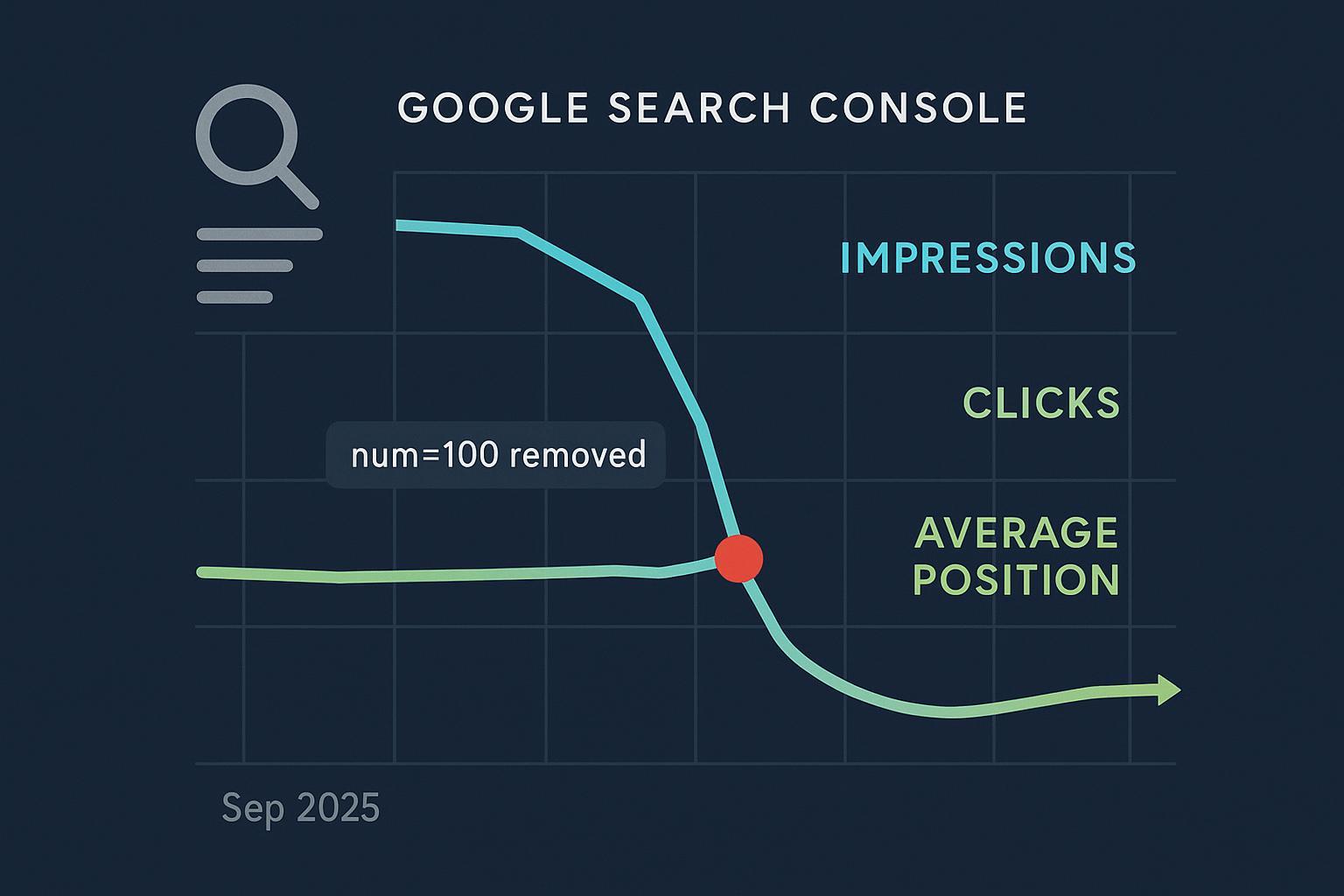Google num=100 Removal: SEO Impressions Drop Explained (2025)
Why did Google Search Console impressions drop in 2025? Learn about num=100 removal, unchanged rankings, and how to respond. Read the expert checklist.

Updated on 2025-10-06
What changed—and why your dashboards look “broken”
Between September 12–18, 2025, Google stopped honoring the old results-per-page parameter (commonly used as num=100). In practical terms, even if a URL includes that parameter, Google now returns its default page size (about 10 results). According to Search Engine Land’s 2025-09-18 report, Google “does not support the results-per-page parameter” going forward, which explains the sudden reporting distortions across the industry (Search Engine Land confirmation, 2025-09-18).
If your Google Search Console (GSC) impressions plunged in mid-September while traffic stayed steady, you’re not alone. Early community coverage documented the change as it rolled out and the immediate confusion it caused among rank trackers and SEOs (SERoundtable early reports, 2025-09-12/15).
The timeline in brief
- 2025-09-12: Community spots Google testing or dropping 100-results pages; early anomalies appear in GSC and rank tracking (SERoundtable timeline, 2025-09-12/15).
- 2025-09-15: Search Engine Land notes rank and position tracking is “a mess” as tools struggle with depth and comparability (Search Engine Land status, 2025-09-15).
- 2025-09-18: Search Engine Land reports Google does not support results-per-page anymore, clarifying expectations (Search Engine Land confirmation, 2025-09-18).
Why impressions fell but rankings didn’t: the metric artifact, explained
Previously, many automated queries pulled top 100 results in one shot. Those programmatic checks often created “ghost” impressions for positions 11–100—places humans rarely browse. With num=100 gone, those low-visibility impressions disappear. That does three things:
- Drops total impressions (especially on desktop where scraping was more common)
- Leaves clicks and traffic largely unchanged (because human behavior didn’t change)
- “Improves” average position mathematically, because the long tail of deep positions vanishes from the dataset
Multiple practitioners documented this pattern. Brodie Clark’s 2025-09-26 analysis walks through the “great decoupling,” showing sharp impression declines alongside cosmetic average-position gains while actual traffic remains steady (Brodie Clark analysis, 2025-09-26). A Search Engine Land data roundup citing Tyler Gargula’s 319-property dataset found 87.7% of sites saw impression drops and 77.6% lost unique ranking terms, consistent with measurement noise being removed rather than a true performance collapse (Search Engine Land data roundup, 2025-09-18).
What to do now: measurement hygiene checklist
- Annotate the break. Add notes in GSC and GA4 for 2025-09-12 to 2025-09-18 to flag the structural change.
- Split your dashboards. Treat pre- and post-change periods as separate regimes. Avoid trendlines that cross the breakpoint without adjustment.
- Rebalance KPIs. Prioritize clicks, CTR, and conversions for performance health. Treat impressions as non-comparable to pre-change values.
- Rebuild forecasts. Update SEO forecast models for the new impression distribution. If you need continuity, backcast using clicks and CTR as anchors.
- Separate devices. Document desktop vs. mobile differences; anomalies skewed desktop-heavy.
- Add context to YoY. For Q4 2025 reports, include footnotes that post-09/14 impressions are not apples-to-apples with prior years. When possible, compare by rank buckets (1–10 vs. 11–100) or lean on clicks/conversions.
Rank tracking under new constraints
- Expect higher cost and latency to observe deep positions. Approximating “top 100 visibility” may require up to 10× more requests.
- Focus routine tracking on top 20–50 for core terms; rotate samples across the long tail on a schedule to control costs.
- Use compliant collection. Prefer SERP APIs or first-party collection with respectful rate limits and terms adherence.
- Communicate limits. Be transparent that position metrics for 11–100 are inherently noisier now and may be sampled or delayed.
See the bigger picture across AI surfaces
While classic SERP metrics normalize, it’s smart to track how your brand appears in AI search experiences (Google AI Overviews, ChatGPT, Perplexity). A practical way to keep that holistic view is using Geneo to monitor AI search citations, sentiment, and historical mentions across these answer engines. Disclosure: Geneo is our product.
- If you’re building programs to influence and track citations, this guide to Reddit community tactics for AI search citations outlines practical workflows.
- For teams evaluating tooling, this comparative context on AI visibility tools and alternatives in 2025 can help with vendor selection.
How to explain this to stakeholders (copy/paste-ready)
- Executive summary: “In mid-September 2025, Google removed a parameter used by rank trackers to fetch 100 results at once. This removed inflated impressions for deep rankings. Our clicks and traffic are stable; the impressions drop is a measurement change, not a performance decline. Average position ‘improved’ due to math, not true rank gains.”
- KPI note for reports: “Post-2025-09-14 impression counts are not directly comparable to prior periods. For continuity, evaluate clicks, CTR, and conversions, and segment ranking analyses into page-one vs. beyond page-one where needed.”
Short FAQ
- Is this a ranking drop? No. Multiple 2025 analyses show clicks and traffic were steady while impressions fell due to the parameter removal, as covered by Search Engine Land and independent experts.
- Should we change our SEO goals? Keep growth targets tied to clicks, conversions, and page-one CTR. Treat impressions as a reset metric starting mid-September 2025.
Vendor adaptation snapshot (selected)
Tool stacks also adjusted collection strategies. For example, SISTRIX initially recorded only top 10 results and later restored daily visibility data in key markets, while noting changes to desktop SERP updates—illustrating the industry-wide reset in depth and methodology (PPC Land recap of SISTRIX updates, 2025-10-01).
Bottom line
This is a data-quality event, not a ranking crisis. Rebaseline your reporting, reset expectations around impression trends, and double down on what moves the needle—page-one CTR and conversions—while keeping an eye on AI-driven surfaces where discovery increasingly happens.
Change-log
- 2025-09-12: Community spots num=100 removal/testing (SERoundtable).
- 2025-09-15: Industry notes rank tracking disruption (Search Engine Land).
- 2025-09-18: Industry reports Google does not support results-per-page parameter (Search Engine Land).
- 2025-09-26: Analysis published on impression/position artifacts (Brodie Clark).
- 2025-10-01: Roundups on vendor adjustments (e.g., SISTRIX) published.
